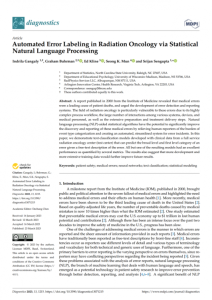Johns Hopkins investigators conducted a survey to determine why radiation oncology professionals “fail to use online error-reporting systems designed to improve patient safety and quality of care.”1 Survey questioners were mailed to various radiation oncologists as well as medical physicists, nurses, dosimetrists, and therapists located at four radiation oncology institutions.
The results of the survey were published in Johns Hopkins News and Publications.2 The article reveals that most radiation oncologists and nurses do not enter data in online error-reporting systems. However, medical physicists, dosimetrists, and therapists report using these systems with the greatest frequency. Though most believed reporting of errors was necessary in their roles, radiation oncologists and residents feared embarrassment, getting other physicians into trouble, and liability as the most common reasons for not reporting errors online.3
The article describes the vast majority of survey respondents admitting to witnessing near-misses and mistakes in their clinical operations.4
The article states most respondents support reporting of errors and not assigning blame to individuals. The majority favor use of a nation-wide reporting system for radiation oncology.5
1,2,3,4,5Johns Hopkins Medical Institutions (2011, October 3). Survey reveals reasons doctors avoid online error-reporting tools. Johns Hopkins News and Publications.







2 Responses
My brother suggested I would possibly like this website. He
was once totally right. Thiis publish actually made my
day. You can not imagine simply how much time I hadd spent
for this info! Thank you! https://66bb4c96e165c.site123.me/
We are happy to hear this information was useful to you.